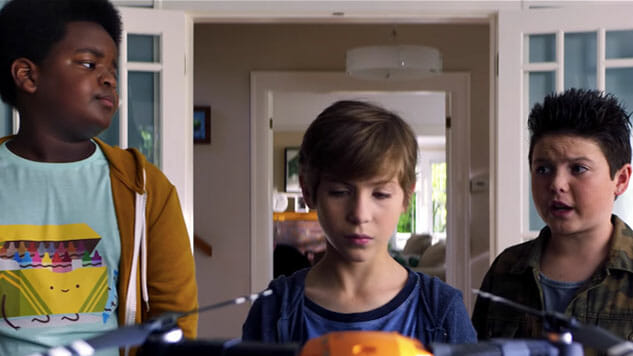What We Mean by “Good Boys”
Under the raunchiness, there’s earnest hope for the next generation.

Note: Be sure to read Oktay Ege Kozak’s full review of Good Boys and be wary of a few mild spoilers below.
One of my girlfriend’s middle school-aged kids has some obnoxious bit of red tape at school called a “cumulative folder,” and you don’t get three guesses to tell me how the administrators abbreviate the first word in emails. I was the only person in the theater who guffawed out loud when one of the tween protagonists of Good Boys pronounced that word in that way. It happened early in the film, as audiences are getting to know Max (Jacob Tremblay), Lucas (Keith L. Williams) and Thor (Brady Noon), and immediately it felt like writers Lee Eisenberg and Gene Stupnitsky (who also directed) had the right grasp on how obsessed with and simultaneously blissfully ignorant of adult situations tween boys actually are.
Because of that coincidental wordplay, it also reminded me that it’s a miracle young people ever take us seriously, and a refreshing turn of events when a movie takes young people seriously. We are meant to laugh at the Beanbag Boys, as the trio call themselves. Mostly we’re laughing at the absurdities of their situation and the earnestness of their convictions. But—and this is important—we aren’t laughing at what they believe.

Max likes a girl at school, and his only chance to get in a first kiss with the Woman He Will Love Forever is a party at the cool kid’s house (Izaac Wang, providing just as much straight-faced obscenity as the protagonists). Thor, meanwhile, is being bullied into trying to prove he’s a tough-ass beer drinker when he’d really rather just sing in the school musical. Lucas’ parents are splitting up, and he doesn’t want to share it with his friends for fear of seeming weak or burdening them.
Utterly clueless in the ways of smooching and too naïve to put a sufficiently narrow search term into Google, they decide to use Max’s father’s drone to spy on the college girl next door and her best friend, who are just trying to get out of town and get high on molly. The boys end up in possession of the pills, and the college girls get the drone. When the boys’ steadfast anti-drug stances preclude them from willingly giving up the stash in exchange for the drone, they skip school and lead the girls on a chase to the mall to buy a replacement drone.
The movie was gleefully marketed as one in which tween kids unleash unrestrained f-bombs and obliviously cavort about on the edge of adult situations. It very much is, and it mines some random laughs out of the premise: At one point, the boys need to secure the necessary funding for the replacement drone by selling one of Lucas’ rare game cards. When Lucas won’t part with it, the weirdo buyer (Stephen Merchant, actually), instead decides to buy the “CPR doll” that the boys have been using to practice kissing. (They ask her if she consents, because of course they would.)

The naughty behavior, the misbehavior, the rules-breaking, separates the anarchic need to break childhood boundaries from the kind of toxic behavior that so many people explain away with “boys-will be boys.” Boys will be boys, but the movie isn’t letting the kids off the hook for any truly shitty behavior. They do regard things like drugs and drinking as unforgivable moral transgressions, but it also openly shows that they’ll outgrow that silliness like we all do: At one point they spill their guts to an exhausted off-duty cop who is too tired to get the easiest collars of his career.
